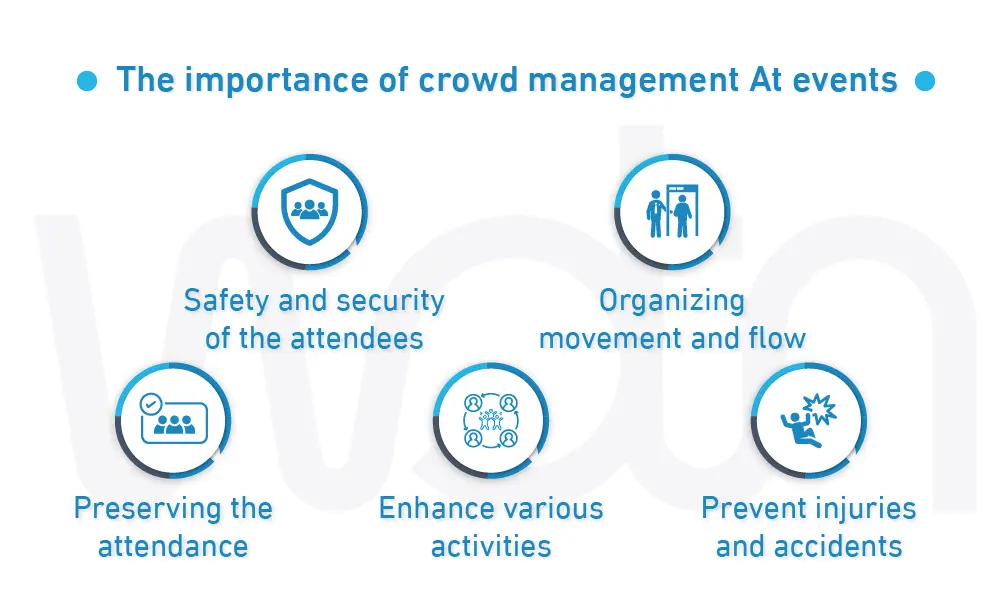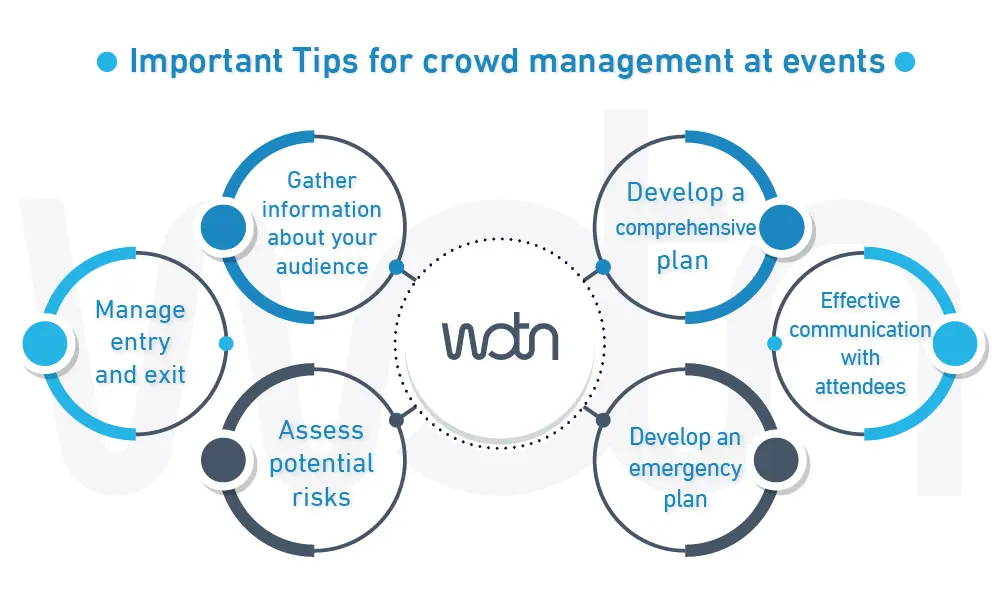Your Vision, Delivered
Say hello to the real experience!
Bring your next event to life—guided by experience, innovation, and excellence.
Let’s create together
In 2019, a tragedy occurred at the Love Parade festival in Duisburg, Germany, where 21 people lost their lives and over 500 people were injured due to overcrowding and congestion in a narrow tunnel, which served as the only entrance to the festival. This incident goes down in history as one of the worst disasters in the music festival industry, prompting questions about the organizers' negligence and the inefficiency of crowd management at large-scale events.
Neglecting the importance of crowd management at events can have severe consequences, such as stampedes, overcrowding, injuries, and even fatalities. Therefore, In this article, we will dive deep into the world of crowd management, exploring its various components. By the end of this article, you'll have a solid understanding of why effective crowd management is essential and how it can make all the difference in ensuring a safe and successful experience for Participants.
The process of crowd management is a critical and delicate aspect of organizing events such as conferences, exhibitions, and festivals. It involves meticulous planning and the execution of an administrative plan to effectively manage the movement of visitors while prioritizing their safety and well-being. The ultimate goal is to minimize congestion and prevent unwanted gatherings, facilitating smooth and organized movement of the audience throughout the event. Achieving this requires a continuous study of the audience, monitoring their behavior, and guiding them towards safe and appropriate movement.
As events continue to proliferate, the need for effective management of visitor movement becomes increasingly paramount. Therefore, the development and improvement of methods to manage visitors are constantly pursued, leveraging technology and modern techniques to achieve optimal results in Planning and Managing Exhibitions and other events.
As previously discussed, effective crowd management plays a pivotal role in ensuring the success of any event. As such, it is imperative for event organizers to fully grasp its significance. Below are several key reasons, as:

One of the most significant benefits of effective crowd management is the assurance of attendee safety and security. With proper planning and orderly arrangements, incidents of overcrowding and panic - common in large-scale events when people attempt to leave simultaneously - can be avoided. Emergency exits are designated, and evacuation plans are implemented to handle potential emergencies, including injuries or natural disasters.
Also plays a key role in organizing and arranging events to cater to the number and interests of attendees. This includes the fair, efficient, and effective distribution of spaces, resources, and services to ensure a unique and enjoyable experience for everyone. This involves the distribution of platforms, chairs, audiovisual equipment, and lighting in a manner that facilitates the optimal presentation of the event.
Effective crowd management also contributes to attracting, retaining, and increasing the number of attendees at an event by creating an enjoyable and satisfying experience. This can be achieved by providing the necessary amenities and facilities, such as restrooms, shaded areas, and additional entertainment options, to meet attendees' needs and make them feel comfortable and engaged.
It also promotes the support, development, and diversification of activities offered at an event. A wide range of activities, whether cultural, sports, entertainment, commercial, or social, are organized to cater to the diverse interests of attendees. These activities are coordinated in a manner that aligns with the values and interests of the attendees, showcasing their diverse cultures.
It's important to note that the role of crowd management extends beyond organizing attendees and managing the flow of events. It also plays a critical role in analyzing, evaluating, and monitoring the risks that the event, attendees, organizers, participants, and the community at large may face. Potential risks are identified, and proactive or responsive plans and strategies are developed to address them. In addition, policies and guidelines are implemented to handle potential incidents and security threats, helping to minimize risks and ensure the safety of everyone involved.
Read More: The Ultimate Guide to Virtual Events: Types and Planning Steps
Having a specialized team in crowd management is an essential component of the success of any event or exhibition. This team works tirelessly to organize and coordinate the event in a manner that prioritizes the safety and security of attendees, while also addressing their needs and expectations related to the event.
Moreover, a specialized team in crowd management also helps improve and enhance the various activities within the event, ensuring they align with the interests and values of the attendees. To ensure everyone's safety, this team works on analyzing and assessing potential risks and developing strategies to address them.

To form a cohesive team, it's crucial to define the core responsibilities of team members and appropriately distribute tasks among them. This requires a clear understanding of the key roles that contribute to a satisfying and safe experience for attendees at the event. Some of these key roles may include:
Support personnel are individuals who carry out specific tasks within the framework of crowd management. This includes:
Despite its importance in events, there are some misconceptions that can hinder or harm crowd management efforts. Some of these misconceptions include:
This is a common misconception, Event organization is a comprehensive process that requires cooperation and coordination among all event team members, including the planning, organizing, interacting, and developing teams. Proper organization involves analyzing potential risks and developing strategies to deal with them, ensuring the safety and security of both attendees and event staff.
This is not true, as organization requires flexibility and creativity to adapt plans and procedures to different circumstances and unexpected situations. Therefore, the event team needs to understand, respect, and meet the needs, desires, and cultures of the attendees, rather than simply imposing laws and rules.
This is a misconception, crowd management is considered an important and necessary investment to ensure the success of the event. Effective crowd management helps in efficiently providing resources and services, ensuring the safety and security of attendees, and creating a positive and welcoming environment that encourages attendees to return in the future and recommend the event to others.
It is essential to correct these misconceptions and emphasize that the organizing process is not solely a responsibility or a financial burden, but an integral and vital part of successful event management.
Read More: Discover Hybrid Conferences and How to Organize Them Successfully
There are some important tips that you should know to achieve success in your event, and they are:

To ensure that your event is well-received, it is crucial to gather information about your audience's characteristics. This includes their demographics, interests, cultures, and the number of attendees. You can gather this information through research, surveys, or pre-event studies. Additionally, reviewing previous data and experiences can also provide valuable insights.
It is important to manage the entry and exit points for your event in order to ensure the safety of your attendees. This involves identifying a limited number of entry and exit points that are supervised by trained and qualified individuals. By doing so, you can regulate the flow and number of attendees, and you may also need to restrict entry when capacity is reached.
Before hosting an event, it is critical to assess the potential risks that your crowd may face. This includes overcrowding, panic, violence, terrorism, or natural disasters. In order to mitigate these risks, it is important to develop proactive or responsive plans, strategies, and policies. These measures will help you deal with any potential issues that may arise during the event.
To ensure a safe and enjoyable event experience for all attendees, event organizers should create a detailed crowd management plan. This plan should outline the main objective of crowd management, along with the planned strategy to achieve it. It should also include policies and procedures related to management, which clearly define the responsibilities and authorities of the team. Furthermore, the plan should provide guidelines and instructions for attendees regarding proper behavior within the event, as well as support and guidance for individuals with special needs. Finally, a trained and qualified team should be assigned to handle any emergency situations that may occur during the event.
To ensure a smooth and enjoyable event experience for all attendees, it is important to provide clear and concise information at key points throughout the event. This includes information on site maps, restroom locations, ticket sales points, and food and beverage availability. Various communication tools such as signage, screens, or mobile walls can be used to display this information.
Anticipate potential risks and challenges that may arise during the event and have contingency plans in place. This includes having emergency response procedures, medical support, evacuation plans, and communication protocols. Regularly review and update these plans based on lessons learned from previous events and feedback from attendees.
In conclusion, crowd management is a challenging task that plays a vital role in achieving successful events. It requires thorough planning and coordination among a qualified and trained team to ensure attendee satisfaction, safety, and risk mitigation in crowded environments. Continuous evaluation and the implementation of effective policies and procedures are essential to achieving these goals. Ultimately, the aim is to provide attendees with a seamless and enjoyable event experience that meets their expectations.
If you're interested in learning more about event organization, whether it's managing conferences , planning and organizing workshops , or coordinating exhibitions and festivals, we invite you to follow us for more valuable information in this field.
Say hello to the real experience!
Bring your next event to life—guided by experience, innovation, and excellence.
Let’s create together
